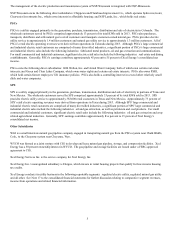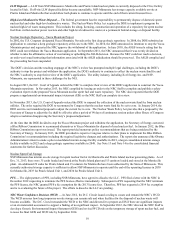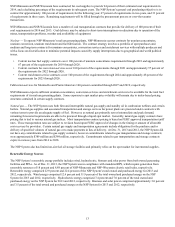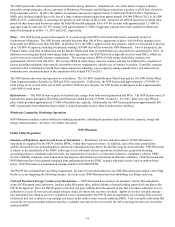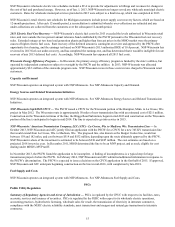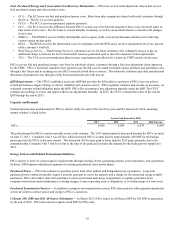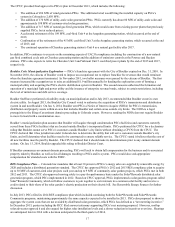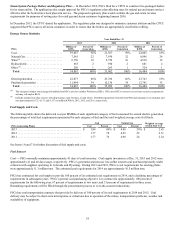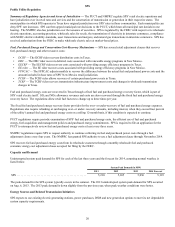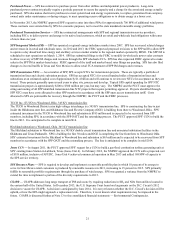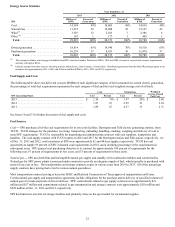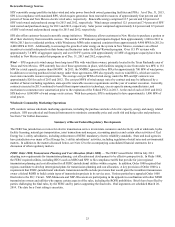Xcel Energy 2013 Annual Report Download - page 33
Download and view the complete annual report
Please find page 33 of the 2013 Xcel Energy annual report below. You can navigate through the pages in the report by either clicking on the pages listed below, or by using the keyword search tool below to find specific information within the annual report.15
NSP-Wisconsin’s wholesale electric rate schedules included a FCA to provide for adjustments to billings and revenues for changes in
the cost of fuel and purchased energy. However, as of Jan. 1, 2013, NSP-Wisconsin no longer served any wholesale municipal electric
customers. Rates for wholesale municipal services provided in 2012 were subject to a final true-up, which was completed in 2013.
NSP-Wisconsin’s retail electric rate schedules for Michigan customers include power supply cost recovery factors, which are based on
12-month projections. After each 12-month period, a reconciliation is submitted whereby over-collections are refunded and any
under-collections are collected from the customers over the subsequent 12-month period.
2013 Electric Fuel Cost Recovery — NSP-Wisconsin’s electric fuel costs for 2013 exceeded the levels authorized in Wisconsin retail
rates, and were outside the two percent annual tolerance band established by the PSCW pursuant to the Wisconsin fuel cost recovery
rules. Extended outages at two base load generation plants and higher than forecast prices in the MISO market were the primary
causes of higher electric fuel costs. Rate recovery of the deferred amount is contingent on review and approval by the PSCW after
opportunity for a hearing, and the earnings test based on NSP-Wisconsin’s 2013 authorized ROE of 10.4 percent. NSP-Wisconsin has
reviewed its 2013 fuel cost under-recovery, and has completed the earnings test, and has determined that it would be ineligible for rate
recovery of any 2013 deferred fuel costs. Accordingly, NSP-Wisconsin has expensed all 2013 fuel costs.
Wisconsin Energy Efficiency Program — In Wisconsin, the primary energy efficiency program is funded by the state’s utilities, but
operated by independent contractors subject to oversight by the PSCW and the utilities. In 2013, NSP-Wisconsin was allocated
approximately $8.3 million of the statewide program costs. NSP-Wisconsin recovers these costs in rates charged to Wisconsin retail
customers.
Capacity and Demand
NSP-Wisconsin operates an integrated system with NSP-Minnesota. See NSP-Minnesota Capacity and Demand.
Energy Sources and Related Transmission Initiatives
NSP-Wisconsin operates an integrated system with NSP-Minnesota. See NSP-Minnesota Energy Sources and Related Transmission
Initiatives.
NSP-Wisconsin CapX2020 CPCN — The PSCW issued a CPCN for the Wisconsin portion of the Hampton, Minn. to La Crosse, Wis.
project in May 2012. The Wisconsin route is approximately 50 miles of new transmission line with an estimated cost of $211 million.
Construction on the Wisconsin terminus of the line, the Briggs Road Substation, began in mid-2013 and construction on the Wisconsin
portion of the line is anticipated to begin in mid-2014. The line is expected to go into service in 2015.
NSP-Wisconsin / American Transmission Company, LLC (ATC) - La Crosse, Wis. to Madison, Wis. Transmission Line — In
October 2013, NSP-Wisconsin and ATC jointly filed an application with the PSCW for a CPCN for a new 345 KV transmission line
that would extend from La Crosse, Wis. to Madison, Wis. The proposed line, also known as the Badger Coulee line, would run
between 159 and 182 miles, and cost between $514 and $552 million, depending upon the route ultimately approved by the PSCW.
NSP-Wisconsin’s share of the investment is estimated to be between $230 and $247 million. The cost estimates are based on a
projected 2018 in-service year. In December 2011, MISO determined the line to be an MVP project, and as such, eligible for cost
sharing under MISO’s MVP tariff.
In November 2013, the PSCW found the application to be incomplete. A finding of incompleteness is a typical step for large
transmission projects before the PSCW. In February 2014, NSP-Wisconsin and ATC submitted additional information in response to
the PSCW’s determination. The PSCW is expected to issue a decision on the CPCN application in the first half of 2015. If approved,
NSP-Wisconsin and ATC anticipate beginning construction on the line in mid-2016, with completion by late-2018.
Fuel Supply and Costs
NSP-Wisconsin operates an integrated system with NSP-Minnesota. See NSP-Minnesota Fuel Supply and Costs.
PSCo
Public Utility Regulation
Summary of Regulatory Agencies and Areas of Jurisdiction — PSCo is regulated by the CPUC with respect to its facilities, rates,
accounts, services and issuance of securities. PSCo is regulated by the FERC with respect to its wholesale electric operations,
accounting practices, hydroelectric licensing, wholesale sales for resale, the transmission of electricity in interstate commerce,
compliance with the NERC electric reliability standards, asset transactions and mergers and natural gas transactions in interstate
commerce.


